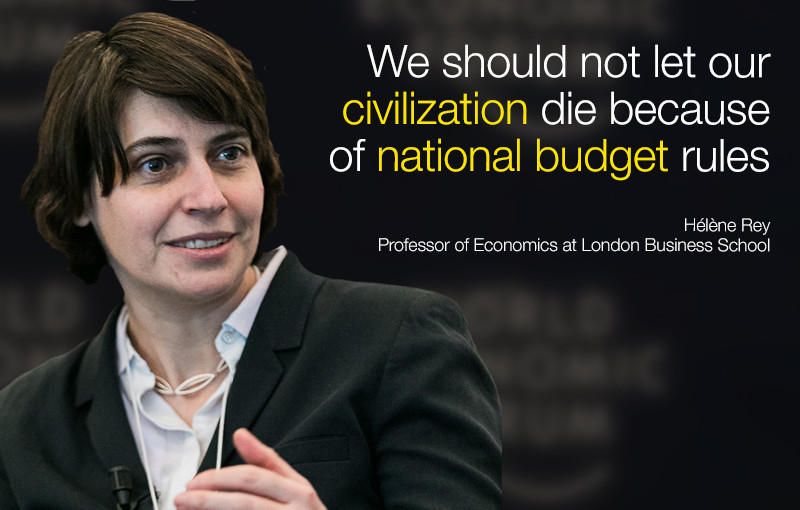Why Europe needs a Churchill moment to help refugees

A migrant walks through a frozen field after crossing the border from Macedonia, near the village of Miratovac, Serbia Image: REUTERS/Marko Djurica
It is time for a European Churchill moment. Donald Tusk, the President of the European Council Tusk, Jean-Claude Juncker, the President of the European Commission, France’s President François Hollande and Germany’s Chancellor Angela Merkel all have to rise up to face a dire situation.
It is all too clear that if big, courageous actions are not now forthcoming at the European level, if we do not show solidarity, terrorists will insidiously destabilize our societies by promoting fear among our people and killing more innocents.
Their awful acts are playing into the hands of European xenophobic parties whose mantra is to close up everything, to retreat behind borders and to blame migrants for all ills. Like the Front National in France, European extremist parties sell the electorate a delusional view of the world, in which people are supposed to take comfort in being protected behind some kind of fortified Maginot line, while forgetting our values and ruining our economies and therefore our future strength.
The treacherous path of protectionism
Economic history has many examples of the detrimental effects of protectionism on prosperity. By championing national preferences and the dismantlement of Europe, extremist parties would lead countries towards a path of decline and pauperisation, with societies missing out on innovation and opportunities.
Such a path often goes together with censorship of the media and civil right restrictions.
Refugees are likely to suffer even more as time unfolds, as public opinions will worsen due to the difficulties in integrating very large numbers of refugees, in the rare countries such as Germany where the population and the government have been welcoming. It is already the case that many European countries, such as France and the UK, are taking in a pitifully low amount of refugees and are not doing their share.

The truth is that asylum seekers are like the people who died in the Paris shootings. Both are victims of the same barbarians. Some are slaughtered or thrown into exile to try to escape death or starvation in Syria or in Iraq, others are killed in a concert hall or in a cafe in Paris by the kalachnikoffs of the same fanatics, their “brothers”. Democracies - societies sharing humanistic values - have no choice but to resist.
President Tusk should announce a large, coordinated plan to defend European borders, provide collective security and secure safe routes for asylum seekers. At the same time, Europeans have to invest massively in protecting asylum seekers, building homes and integrating them. There should be some sharing of defense spending, including for operations on foreign soil aiming at achieving collective security in Europe. There should be coordinated diplomatic efforts.
Because these actions are about the survival of people and of the democracies of Europe, they should take priority. Because these objectives are for the benefit of all European countries and all are at risk, the funding should be European. Because large resources are needed to secure borders and help refugees, ensure our defense and strike our enemies, these actions should be funded by the issuance of bonds at the European level, earmarked for these goals.
According to Jacob Kirkegaard and Thomas Philippon, Frontex – the EU agency in charge of External Borders – has a budget of 143 million euros for 2015. The U.S., on the other hand, spends about $32 billion annually to secure its borders.
Organizing European funding would allow countries who have no fiscal space to invest enough resources to enable a better integration of refugees and to allow the swift sorting of refugees from other migrants at external borders.
Scaling up European spending on these set of projects to reach several tens of billions of euros is warranted and probably the best investment Europe can make now. It should do so very swiftly. The human, political, humanitarian and even economic dividends would be enormous. We should not let our civilization die because of national budget rules.
Don't miss any update on this topic
Create a free account and access your personalized content collection with our latest publications and analyses.
License and Republishing
World Economic Forum articles may be republished in accordance with the Creative Commons Attribution-NonCommercial-NoDerivatives 4.0 International Public License, and in accordance with our Terms of Use.
The views expressed in this article are those of the author alone and not the World Economic Forum.
Stay up to date:
Migration
Related topics:
Forum Stories newsletter
Bringing you weekly curated insights and analysis on the global issues that matter.
More on Forum InstitutionalSee all
Beatrice Di Caro
December 17, 2024






